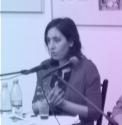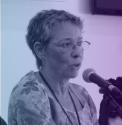City of Women Festival wins Princess Margriet Award

This spring (March 2019) an international jury met to select two exemplary laureates for this year’s Princess Margriet Award: Ahdaf Soueif (Cairo/London) and City of Women Festival (Ljubljana). This year’s laureates represent distinct cultural approaches, but both offer a more hopeful vision of democracy by redefining our understanding of culture and its capacity to improve a common European social reality.
Ahdaf Soueif (1950) is a writer and cultural activist working in Cairo and London. In the last 20 years she has courageously merged literature and activism, building a body of fiction and committed journalism that responds to the legacies of European intervention in conflicts outside of the continent’s immediate territorial boundaries. The Palestine Festival of Literature (2008–present), of which she is founding chair, created a new form of international cultural cooperation to break through Israeli occupation. Soueif’s consistent opposition to both authoritarianism and colonialism has marked her as a cultural figure of international importance inspiring new generations of critical voices throughout Europe and its neighbouring regions. Throughout her career, Soueif has been a tireless mediator between the supposed opposition of east and west, working to find common ground for a more democratic future.
City of Women Festival (Mesto žensk) is an international contemporary arts festival that takes place in Ljubljana. Since 1994, the festival has welcomed over 700 advocates for greater gender and social equity, including artists, collectives, curators, theorists and activists from all over the world. Its inclusive understanding of contemporary feminism and its transdisciplinary framework highlight artists who blur the boundaries of genre and bridge the perceived separation between thought and action, creating new tools for a feminist perspective that is alert to the ways that gender overlaps with class, race and other nodes of oppression. The continuity of the festival’s residence in Ljubljana and the very name “City of Women” point toward the utopian potential of a space that nurtures the social organisation of women and people of non-binary gender.
Both laureates are cultural change-makers enacting alternatives in the face of political adversities. Their work testifies to the importance of bringing people together across generations and social backgrounds, especially those whose voices are too often neglected. The inclusion of such imaginations is pivotal for European democracy. Gender and sexual politics also play an important role in their respective practices in an era when the rights of women and LGBTI people are being contested in many parts of the world.
More information at the European Cultural Foundation website.





